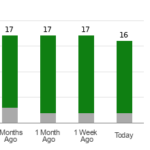The term “Magnificent Seven” has become synonymous with seven mega-cap tech-oriented companies including Microsoft, Apple, Nvidia, Alphabet, Amazon, Meta Platforms, and Tesla. While the idea of owning one share of each might seem appealing for its simplicity, a deeper look reveals more prudent strategies that could potentially yield greater financial rewards in the long run.
Let’s delve into what buying one share of each of the Magnificent Seven stocks entails and explore valuable lessons that can positively impact your investment portfolio for years to come.

Image source: Getty Images.
Examining the Merits and Drawbacks of the One-Share Strategy
While owning a single share of a company can create a sense of involvement and ‘skin in the game,’ the approach has its pitfalls. Stock prices are subject to various factors such as outstanding share count, stock splits, and market capitalization, making the arbitrary price of a stock an unreliable metric for determining investment weightage.
Building initial positions is commendable, but purchasing one share of each Magnificent Seven stock may not be the wisest choice. Notably, due to significant price differences, stocks like Nvidia, Meta Platforms, and Microsoft would be disproportionately weighted compared to the others. As of April 26 closing prices, the total cost for one share of each stock would amount to $2,417.86.
Company | Price Per Share | Weighting |
|---|---|---|
Nvidia | $877.35 | 36.3% |
Meta Platforms | $443.29 | 18.3% |
Microsoft | $406.32 | 16.8% |
Amazon | $179.62 | 7.4% |
Alphabet | $173.69 | 7.2% |
Apple | $169.30 | 7% |
Tesla | $168.29 | 7% |
Data source: Yahoo Finance prices as of market close on April 26.
Consider an alternative approach by investing in a fund with a substantial exposure to the Magnificent Seven. The Vanguard Growth ETF and the Vanguard Mega Cap Growth ETF offer high allocations up to 57% in the Magnificent Seven. While these ETFs are market-cap-weighted, they provide a cost-effective way to benefit from these tech giants.
The true value lies in developing a well-defined investment thesis that guides your decision-making process. Successful investors rely on such principles, which lead to consistent outcomes and increased success over time.
An investment thesis helps you understand the essence of each company, what drives their growth, and how to make informed decisions during market fluctuations. It acts as a filter against market noise and emotional responses.
Simply purchasing one share of each Magnificent Seven stock without a solid understanding of the underlying businesses and market expectations may hinder your investment choices. It is essential to grasp the core components driving earnings growth for each company to make informed investment decisions.
Take, for example, Microsoft’s involvement in cloud infrastructure and AI, Apple’s position in consumer electronics, entertainment, and AI, Nvidia’s expertise in semiconductors and gaming, and Alphabet’s presence in internet search and advertising – these factors should form the basis of your investment thesis.
The Magnificent Seven: a Valuation Analysis for Investors
Assessing Valuations Based on Forward Earnings Estimates
As investors navigate the tumultuous waters of the market, a crucial skill involves assessing a company’s valuation against forward earnings estimates. Understanding the core business areas of key players such as Amazon, Meta Platforms, and Tesla can provide a solid foundation for evaluating their market worth.
Amazon, with its diverse portfolio encompassing cloud infrastructure, e-commerce, entertainment, AI, and retail, remains a titan in the industry. In contrast, Meta Platforms focuses on social media, advertising, AI, metaverse, and consumer electronics. On the other hand, Tesla stakes its claim in electric vehicles, renewable energy, energy storage, AI, and robotics.
The dynamics of the market are such that companies like Nvidia, with a soaring 73.5 price-to-earnings (P/E) ratio and a 35.1 forward P/E ratio, exemplify the volatility and expectations that investors grapple with daily. Analysts anticipating a doubling of earnings within a year may find Nvidia’s stock to be a potentially lucrative investment, whereas underperformance could elevate concerns over an overvalued market presence and trigger a sell-off.
Investment Strategy: Choose Wisely
Investing is akin to selecting ripe fruit at the market – it’s essential to cherry-pick quality companies offered at a justifiable price. The notion of acquiring all “Magnificent Seven” stocks might tickle the fancy of some investors, but a prudent approach involves starting with a well-researched, high-conviction choice that aligns with one’s financial objectives and risk appetite.
For value-oriented investors seeking stability, a stalwart like Apple might present an attractive option. Conversely, those with a penchant for high-risk, high-reward ventures could find Nvidia, an expensive yet rapidly growing entity in the AI domain, to be a daring venture.
Building a robust investment portfolio over time is akin to crafting a finely aged scotch – a labor of love that requires dedication, patience, and a well-thought-out strategy. Without these guiding principles, one might find themselves adrift on choppy investment seas, risking the shipwreck of their financial goals.
Unlocking the Potential of Nvidia: A Historical Perspective
Before plunging into an investment in Nvidia, it’s prudent to heed the advice of seasoned analysts. The Motley Fool Stock Advisor team recently unveiled the top 10 stocks poised to unleash monstrous returns in the coming years – with Nvidia missing the cut. This candid evaluation harkens back to April 15, 2005, where an investment of $1,000 following their recommendation would have ballooned to a staggering $544,015.
The Stock Advisor service, a beacon for investors seeking a blueprint for success, boasts a track record that puts the S&P 500 to shame, having quadrupled returns since 2002. Such success stories underscore the importance of astute stock selection and long-term investment vision.
Ready to explore the top 10 stocks poised for success? Click below to delve into potential market gems.





